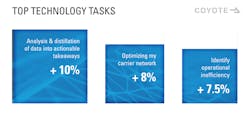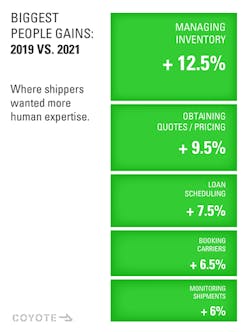Supply Chain Professionals Favor Human Support in Response to Pandemic
Looking at the interplay between workers and automation in the supply chain, Coyote Logistics released findings of its 2021 Tech + Humanity research study with the goal of analyzing how this balance of human expertise and technology across key supply chain tasks has shifted since 2019 and as a result of COVID-19.
These results, drawn from responses from 800 global supply chain and transportation decision-makers, clearly demonstrate that a strategic balance of technology and human expertise is still the preferred approach. However, notably, the research saw a decrease in preference for technology and a greater reliance on people.
This is a significant finding following a year of Zoom calls, remote working environments and the overall emphasis being put on automation and digitalization across the supply chain. The research concludes that the COVID-19 pandemic was a key trigger for this shift back towards human expertise, as it was the dedicated people across the supply chain that stepped up to keep goods moving.
While a 3% decline may not seem like a huge difference, when considering recent trends, even a slight shift away from technology is a resounding call from supply chain leaders that people are still a critical part of logistics management.
“Supply chain professionals are making more critical decisions today that affect the long-term success of their businesses than ever before," said Jonathan Sisler, CEO of Coyote Logistics. "This includes determining whether investments in technology or human capital are the right move.”
Tasks moving more towards technology compared to 2019:
From the results of the study, it’s clear that the reliance on technology is evolving within the supply chain. However, its role has simultaneously never been more critical. Here are some of the biggest ways technology use has grown since 2019 among global shippers:
Technology has revolutionized the way members of the supply chain handle data collection and efficiency-based tasks. This will continue to be the case. However, during the COVID-19 pandemic when new levels of volatility and rapid shifts in consumer buying behaviors occurred, only human insight and decision making could solve the challenges businesses were suddenly facing. Members of the supply chain may have realized a lasting benefit.
Tasks leaning more towards human expertise compared to 2019:
According to the study, human-based tasks saw significant gains in several areas compared to the results in 2019. The following are the supply chain tasks that shifted most dramatically towards human support:



